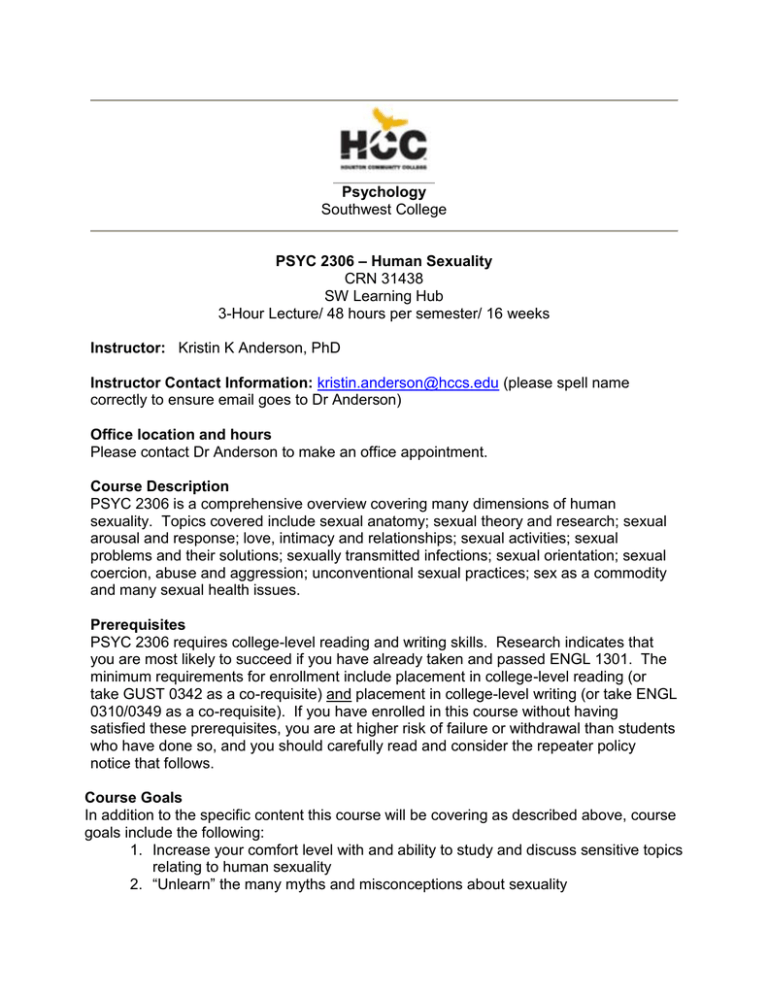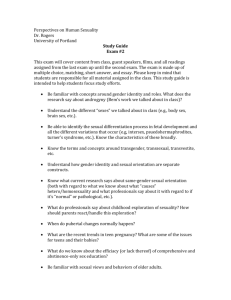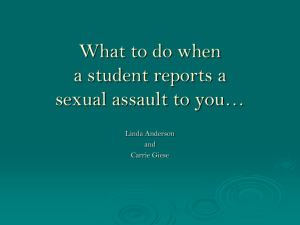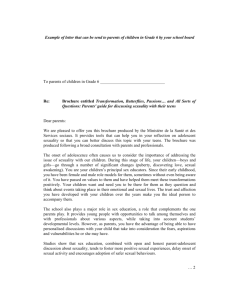
Psychology
Southwest College
PSYC 2306 – Human Sexuality
CRN 31438
SW Learning Hub
3-Hour Lecture/ 48 hours per semester/ 16 weeks
Instructor: Kristin K Anderson, PhD
Instructor Contact Information: kristin.anderson@hccs.edu (please spell name
correctly to ensure email goes to Dr Anderson)
Office location and hours
Please contact Dr Anderson to make an office appointment.
Course Description
PSYC 2306 is a comprehensive overview covering many dimensions of human
sexuality. Topics covered include sexual anatomy; sexual theory and research; sexual
arousal and response; love, intimacy and relationships; sexual activities; sexual
problems and their solutions; sexually transmitted infections; sexual orientation; sexual
coercion, abuse and aggression; unconventional sexual practices; sex as a commodity
and many sexual health issues.
Prerequisites
PSYC 2306 requires college-level reading and writing skills. Research indicates that
you are most likely to succeed if you have already taken and passed ENGL 1301. The
minimum requirements for enrollment include placement in college-level reading (or
take GUST 0342 as a co-requisite) and placement in college-level writing (or take ENGL
0310/0349 as a co-requisite). If you have enrolled in this course without having
satisfied these prerequisites, you are at higher risk of failure or withdrawal than students
who have done so, and you should carefully read and consider the repeater policy
notice that follows.
Course Goals
In addition to the specific content this course will be covering as described above, course
goals include the following:
1. Increase your comfort level with and ability to study and discuss sensitive topics
relating to human sexuality
2. “Unlearn” the many myths and misconceptions about sexuality
1
3. Increase awareness, tolerance and respect for sexual diversity
4. Enhance your skills for evaluating the vast amount of sexual information we all
receive both from the media and our social interactions with others
5. Help you to develop your “personal sexual philosophy”, to allow you to plan
ahead to make responsible, healthy sexual choices throughout life (i.e.,
contraception, avoiding STIs, combating sexual violence, accepting differences,
etc.)
6. Develop an awareness of, ability to recognize, and the comfort to seek medical
attention and treatment for sexual problems or infections, if necessary.
7. Understanding what is “normal” sexuality to help remove personal doubts and
insecurities
8. Enhance your ability to discuss sexuality accurately and openly with others,
including your own children, present or future, and your significant other.
► PLEASE BE AWARE THAT THIS IS A COURSE DESIGNED FOR ADULTS AND, AS
SUCH, CONTAINS SEXUALLY EXPLICIT MATERIALS WITHIN APPROPRIATE
EDUCATIONAL AND PROFESSIONAL BOUNDARIES.
► IMPORTANT! BECAUSE OF THE NATURE OF SOME OF THE MATERIAL IN THIS
COURSE, WE ALL NEED TO WORK TOGETHER TO HELP EVERYONE FEEL AS
COMFORTABLE AS POSSIBLE IN THE COURSE. PLEASE USE GOOD JUDGMENT
WITH COMMENTS AND BEHAVIOR. AVOID COMMENTS AND BEHAVIOR THAT IS
INSENSITIVE AND/OR COULD BE CONSIDERED AS HARRASSMENT.
PSYC 2306 Student Learning Outcomes
1. Explain the basic research and evaluation methods used in human sexuality,
including the strengths and weaknesses of each method and the specific challenges in
sexuality research.
2. Define and identify key concepts in male and female reproductive anatomy and
physiology, contraception and pregnancy, including concepts, facts and theoretical
perspectives.
3. Demonstrate knowledge of and explain concepts related to major social problems in
sexuality: teen pregnancy, STI infection rates, and sexual exploitation.
4. Analyze the effectiveness of different methods of sex education.
5. Apply human sexuality concepts to the solution of current issues and problems
including birth control, prevention of infection, and sexual exploitation.
6. Evaluate the significance of relationships in human sexual behavior.
Core Curriculum Competencies
Credit: 3 (3 lecture)
*
Reading at the college level means having the ability to analyze and interpret a
variety of printed materials, books, and document. All students in PSYC 2306 are
required to read a college-level textbook.
*
Writing at the college level means having the ability to produce clear, correct,
and coherent prose adapted to purpose, occasion, and audience. In addition to
2
*
*
*
*
knowing correct grammar, spelling, and punctuation, students should also
become familiar with the writing process, including how to discover a topic, how
to develop and organize it, and how to phrase it effectively for their audience. All
instructors in PSYC 2306 include at least one written assignment in their syllabi.
Effective speaking is the ability to communicate orally in clear, coherent, and
persuasive language appropriate to purpose, occasion, and audience. Students
in PSYC 2306 are required to communicate about course content in formal or
informal ways as determined by the requirements of each instructor's course
syllabus.
Listening at the college level means the ability to analyze and interpret various
forms of spoken communication. Students in PSYC 2306 are required to listen to
presentations and/or discussions of course content in formal or informal ways as
determined by the requirements of each instructor's course syllabus.
Critical thinking embraces methods for applying both qualitative and
quantitative skills analytically and creatively to subject matter in order to evaluate
arguments and to construct alternative strategies. Problem solving is one of the
applications of critical thinking used to address an identified task. Students in
PSYC 2306 are required to exhibit critical thinking in formal or informal ways as
determined by the requirements of each instructor's course syllabus.
Computer literacy at the college level means having the ability to use computerbased technology in communicating, solving problems, and acquiring
information. Core-educated students should have an understanding of the limits,
problems, and possibilities associated with the use of technology and should
have the tools necessary to evaluate and learn new technologies as they
become available. Students in PSYC 2306 are required to exhibit computer
literacy in formal or informal ways as determined by the requirements of each
instructor's course syllabus.
Grades
Your final course grade will be calculated according to the following formula:
Core Competencies
Best 4 of 5 tests worth 16.67% each*
66.66% (reading, listening, critical thinking) objective
Written Assignments
16.67% (computer literacy, writing, critical thinking) writing
Participation/In Class Assignments
16.67% (speaking, listening, computer literacy) active learning
100%
*Student’s lowest grade will be dropped
Assessments
Your tests will be multiple-choice. Most questions will be selected from the text and
lectures but a few may come from other sources such as the syllabus and videos. All
work will be scored 0 to 100. The final percentage value resulting from the sum of the
above components will be converted into letter grades according to the following scale:
A = 90-100
B = 80-90
C = 70-79
D = 60-69
F = Below 60
3
It is advisable to take all in-class exams at the scheduled time. No make-up tests will
be given. However, since your lowest grade will be dropped, you will be able to drop
the zero for the test you missed. Since only one grade will be dropped, be careful to
miss no more than one test.
Be prepared for tests by bringing your own pencil and scantron. You will be given a test
booklet with questions and you will write your answers on a scantron. On the scantron
you will be asked to write identifying information such as your name, course, class
section, date, and test booklet number. Students who do not provide this information
will have up to 20 points subtracted from their score. You will also be instructed not to
write on the test booklet. Students who mark on the test booklet and/or who take the
test booklet or review sheet out of the room will earn a 0 for the test. These are
careless mistakes that will be costly, so be aware and alert.
Instructional Materials
Text
Hock, R. (2011) Human Sexuality. Pearson Prentice Hall..
Students may choose to use an older edition of the textbook. However, older editions may not contain the
information students need to answer all of the questions on the exams. Students will still be responsible
for all required content even if they are using an older edition of the textbook.
MyPsychKit is a powerful online resource for studying, understanding, and exploring
the material in every chapter of this book. The website includes chapter summaries,
ready-made flashcards, and practice tests. You will also find web links for more
information on each chapter’s topics, links to relevant news articles, and media
resources and videos available for watching from the site. To log on to this resource for
the first time, use the access code that comes free with your text. If you don’t have a
code, you can purchase access and register at www.MyPsychKit.com. This site is for
YOUR personal use to help with studying and understanding (it replaces the traditional
student “study guide”). You are not required to use MyPsychKit—this is optional.
Student Assignments
For most chapters (not all), I will assign homework via my website. You are to check
the website regularly for homework and follow the directions. Bring the homework to
class and keep at your desk until I ask for it. For some assignments, you will earn a
pass or fail depending on completion. Other assignments you will be graded on
thoughtfulness, critical thinking, accuracy and effort. Make sure to make your answers
coherent and readable. Use proper grammar and spelling. Do not plagiarize (this
includes copying from a class mate). You must turn your work in by the due date or you
will earn a 0 for that assignment.
Instructional Methods
This is a lecture course.
4
CALENDAR
WEEK
1
CHAPTER AND TOPIC
Introduction to Class
Ch 1 Studying Human Sexuality
2
Ch 1 Studying Human Sexuality
Ch 2 Sexual Anatomy
3
Ch 3 Physiology of Sexual Response
Ch 3 Physiology of Sexual Response
4
Exam 1 over Chapters 1, 2, 3,
Ch 4 Love, Intimacy, and Sexual Communication
5
Ch 4 Love, Intimacy, and Sexual Communication
Ch 10 Gender
6
Ch 10 Gender
Ch 10 Gender
7
Ch 11 Sexual Orientation
Ch 11 Sexual Orientation
8
Exam 2 over Chapters 4, 10, 11
Ch 6 Sexual Behaviors
9
Ch 6 Sexual Behaviors
Ch 7 Sexual Problems and Solutions
10
Ch 7 Sexual Problems and Solutions
Ch 8 Sexually Transmitted Infections
11
Exam 3 over Chapters 6, 7, 8
Ch 13 Sexual Aggression and Violence
12
Ch 13 Sexual Aggression and Violence
Ch 14 Paraphilias
13
Ch 14 Paraphilias
Ch 15 The Sexual Marketplace
14
Ch 15 The Sexual Marketplace
Exam 4 over Chapters 13, 14, 15
15
Ch 5 Contraception, Ch 9 Conception
Ch 12 Sexual Development
16
Exam 5 over Chapters 5, 9, 12
Note: For more specific dates, see Learning Web
5
HCC Policy Statement - ADA
Services to Students with Disabilities
Any student with a documented disability (e.g. physical, learning,
psychiatric, vision, hearing, etc.) who needs to arrange reasonable
accommodations must contact the Disability Services Office at the
respective college at the beginning of each semester. Faculty is authorized
to provide only the accommodations requested by the Disability Support
Services Office. The ADA counselor at Southwest College is Dr Becky Hauri (713-7187910).
(District ADA Coordinator – Donna Price – 713.718.5165
Central ADA Counselors – Jaime Torres - 713.718.6164
Martha Scribner – 713.718.6164
Northeast ADA Counselor- Kim Ingram – 713.718.8420
Northwest ADA Counselor – Mahnaz Kolaini – 713.718.5422
Southeast ADA Counselor – Jette Lott - 713.718.7218
Southwest ADA Counselor – Dr. Becky Hauri – 713.718.7910
Coleman ADA Counselor – Dr. Raj Gupta – 713.718.7631)
HCC Policy Statement: Academic Honesty
A student who is academically dishonest is, by definition, not showing that the
coursework has been learned, and that student is claiming an advantage not available
to other students. The instructor is responsible for measuring each student's individual
achievements and also for ensuring that all students compete on a level playing field.
Thus, in our system, the instructor has teaching, grading, and enforcement roles. You
are expected to be familiar with the University's Policy on Academic Honesty, found in
the catalog. What that means is: If you are charged with an offense, pleading ignorance
of the rules will not help you. Students are responsible for conducting themselves with
honor and integrity in fulfilling course requirements. Penalties and/or disciplinary
proceedings may be initiated by College System officials against a student accused of
scholastic dishonesty. “Scholastic dishonesty” includes, but is not limited to, cheating
on a test, plagiarism, and collusion.
Cheating on a test includes:
Copying from another students’ test paper;
Using materials not authorized by the person giving the test;
Collaborating with another student during a test without authorization;
Knowingly using, buying, selling, stealing, transporting, or soliciting in whole or
part the contents of a test that has not been administered;
Bribing another person to obtain a test that is to be administered.
Plagiarism means the appropriation of another’s work and the unacknowledged
incorporation of that work in one’s own written work offered for credit.
Collusion mean the unauthorized collaboration with another person in preparing written
work offered for credit. Possible punishments for academic dishonesty may include a
6
grade of 0 or F in the particular assignment, failure in the course, and/or
recommendation for probation or dismissal from the College System. (See the Student
Handbook)
HCC Policy Statements
Class Attendance - It is important that you come to class! Attending class regularly
is the best way to succeed in this class. Research has shown that the single most
important factor in student success is attendance. Simply put, going to class greatly
increases your ability to succeed. You are expected to attend all lecture and labs
regularly. You are responsible for materials covered during your absences. Class
attendance is checked daily. Although it is your responsibility to drop a course for
nonattendance, the instructor has the authority to drop you for excessive absences.
If you are not attending class, you are not learning the information. As the information
that is discussed in class is important for your career, students may be dropped from a
course after accumulating absences in excess of 12.5% hours of instruction. The six
hours of class time would include any total classes missed or for excessive tardiness or
leaving class early.
You may decide NOT to come to class for whatever reason. As an adult making the
decision not to attend, you do not have to notify the instructor prior to missing a class.
However, if this happens too many times, you may suddenly find that you have “lost” the
class.
Poor attendance records tend to correlate with poor grades. If you miss any class,
including the first week, you are responsible for all material missed. It is a good idea to
find a friend or a buddy in class who would be willing to share class notes or discussion
or be able to hand in paper if you unavoidably miss a class.
Class attendance equals class success.
HCC Course Withdrawal Policy
If you feel that you cannot complete this course, you will need to withdraw from the
course prior to the final date of withdrawal. Before, you withdraw from your course;
please take the time to meet with the instructor to discuss why you feel it is necessary to
do so. The instructor may be able to provide you with suggestions that would enable
you to complete the course. Your success is very important. Beginning in fall 2007, the
Texas Legislature passed a law limiting first time entering freshmen to no more than SIX
total course withdrawals throughout their educational career in obtaining a certificate
and/or degree.
To help students avoid having to drop/withdraw from any class, HCC has instituted an
Early Alert process by which your professor may “alert” you and HCC counselors that
you might fail a class because of excessive absences and/or poor academic
performance. It is your responsibility to visit with your professor or a counselor to learn
about what, if any, HCC interventions might be available to assist you – online tutoring,
7
child care, financial aid, job placement, etc. – to stay in class and improve your
academic performance.
If you plan on withdrawing from your class, you may withdraw yourself online (except for
flex entry classes) OR contact a HCC counselor or your professor to withdraw you. This
must be done PRIOR to the withdrawal deadline to receive a “W” on your transcript.
(**Final withdrawal deadlines vary each semester and/or depending on class length,
please visit the online registration calendars, HCC schedule of classes and catalog, any
HCC Registration Office, or any HCC counselor to determine class withdrawal
deadlines.) Remember to allow sufficient time (at least 24-hour response time)
when communicating via email and/or telephone with a professor and/or
counselor. Do not submit a request to discuss withdrawal options less than a
day before the deadline. Some professors may not be willing to process the
withdrawal requests or have specific timelines for processing withdrawal
requests, please consult with your individual professor for details. If you do not
withdraw before the deadline, you will receive the grade that you are making in the class
as your final grade.
(**Please provide specific information about how you want to handle the
withdrawal requests from students.)
Repeat Course Fee
The State of Texas encourages students to complete college without having to repeat
failed classes. To increase student success, students who repeat the same course
more than twice, are required to pay extra tuition. The purpose of this extra tuition fee is
to encourage students to pass their courses and to graduate. Effective fall 2006, HCC
will charge a higher tuition rate to students registering the third or subsequent time for a
course. If you are considering course withdrawal because you are not earning passing
grades, confer with your instructor/counselor as early as possible about your study
habits, reading and writing homework, test taking skills, attendance, course
participation, and opportunities for tutoring or other assistance that might be available.
International Students
Receiving a W in a course may affect the status of your student Visa. Once a W is
given for the course (after you have submitted withdrawal form formally), it will not be
changed to an F because of the visa consideration. Please contact the International
Student Office at 713-718-8520, if you have any questions about your visa status and
other transfer issues.
Classroom Behavior
As your instructor and as a student in this class, it is our shared responsibility to develop
and maintain a positive learning environment for everyone. Your instructor takes this
responsibility very seriously and will inform members of the class if their behavior makes
it difficult for him/her to carry out this task. As a fellow learner, you are asked to respect
the learning needs of your classmates and assist your instructor achieve this critical
goal.
8
Use of Camera and/or Recording Devices
As a student active in the learning community of this course, it is your responsibility to
be respectful of the learning atmosphere in your classroom. To show respect of your
fellow students and instructor, you will turn off your phone and other electronic devices,
and will not use these devices in the classroom unless you receive permission from the
instructor.
Use of recording devices, including camera phones and tape recorders, is prohibited in
classrooms, laboratories, faculty offices, and other locations where instruction, tutoring,
or testing occurs. Students with disabilities who need to use a recording device as a
reasonable accommodation should contact the Office for Students with Disabilities for
information regarding reasonable accommodations
EGLS3 -- Evaluation for Greater Learning Student Survey System
At Houston Community College, professors believe that thoughtful student feedback is
necessary to improve teaching and learning. During a designated time, you will be
asked to answer a short online survey of research-based questions related to
instruction. The anonymous results of the survey will be made available to your
professors and division chairs for continual improvement of instruction. Look for the
survey as part of the Houston Community College Student System online near the end
of the term.
Instructor Requirements
As your Instructor, it is my responsibility to:
Provide the grading scale and detailed grading formula explaining how student
grades are to be derived
Facilitate an effective learning environment through class activities, discussions,
and lectures
Description of any special projects or assignments
Inform students of policies such as attendance, withdrawal, tardiness and make
up
Provide the course outline and class calendar which will include a description of
any special projects or assignments
Arrange to meet with individual students before and after class as required
To be successful in this class, it is the student’s responsibility to:
Attend class and participate in class discussions and activities
Read and comprehend the textbook
Complete the required assignments and exams:
Ask for help when there is a question or problem
Keep copies of all paperwork, including this syllabus, handouts and all
assignments
9
Program/Discipline Requirements
The psychology discipline committee has approved the following requirements for all
sections of PSYC 2306:
All instructors must require at least one written assignment.
All instructors must include assignments, exams, or activities in their syllabi that
address all of the HCCS core curriculum standards (see above).






